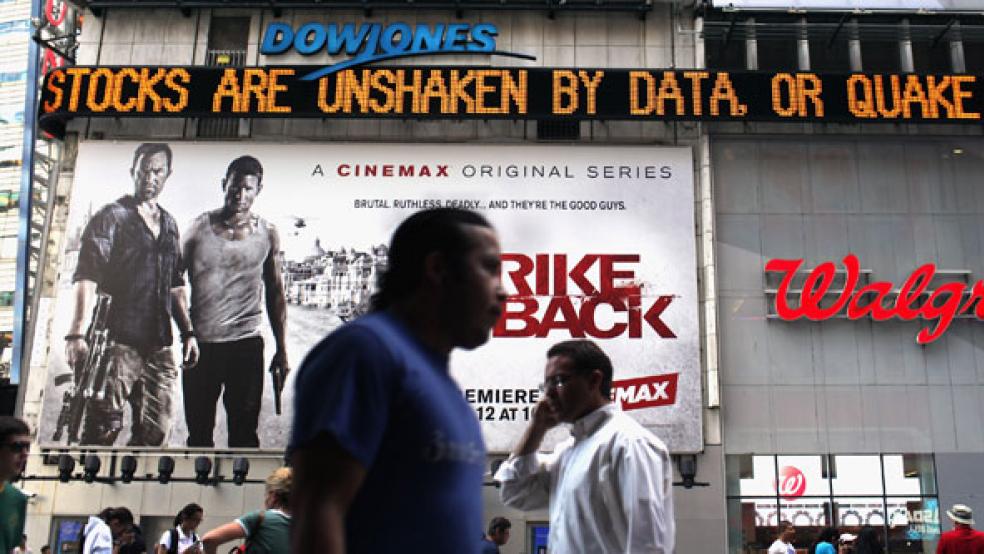Stocks surged to their biggest gains in nearly two weeks as investors ignored weak economic data and pushed aside fears of a double-dip recession to buy cheap shares. Traders also are hoping that Federal Reserve Chairman Ben Bernanke’s scheduled speech on Friday will include new measures to boost economic growth.
The Dow Jones Industrial Average jumped 322.11 points, or nearly 3 percent, to 11,176.76, its first close above 11,000 in four trading days. Percentage gains were even bigger for the broad Standard & Poor’s 500-stock index, which rose 3.4 percent, and the technology-heavy Nasdaq stock index, up 4.3 percent.
The market surge followed big declines in recent weeks. The Dow dropped 512 points on Aug. 4 alone and is still down nearly 14 percent from its high for the year in late April. “People are maybe thinking there was a rush to judgment on the odds of a double-dip recession," Howard Ward, chief investment officer for the Gamco Growth Fund told The Wall Street Journal. "Investors are finally coming in, doing some bargain hunting, and finding stocks are a very enticing alternative to what's being offered in fixed income markets."
Stocks opened higher in the morning following gains in Europe and Asia. There was stronger-thanexpected manufacturing data from China and a betterthanexpected outlook from Europe. Japan’s Nikkei Average rose 1.3 percent and Germany’s DAX was up 1.1 percent.
In the U.S., the Federal Deposit Insurance Corporation reported that there were fewer problem banks in the second quarter than earlier in the year. But the Commerce Department said the number of people who bought new homes dropped for the fourth month in a row. A survey from the Richmond Federal Reserve bank showed a drop in manufacturing activity. But the report pointed to a slowdown but not a recession, said James Paulsen, chief investment strategist at Wells Capital Management. "When people are preparing for a recession, slow growth is good.” he told the Associated Press.
An AP survey of leading economists released just after the market close reported little concern about another recession over the next 12 months, though the respondents saw scant l hope of any meaningful improvement in the economy. On Sunday, Mark Zandi, chief economist at Moody’s Analytics, was cautiously optimistic that the U.S. could avoid a double-dip. “I think with some good policymaking we’ll be able to avoid a recession,” he said on CBS’s Face the Nation. “The most important reason for optimism is that American businesses have done a very good job getting their cost structures down, getting their profitability up, getting their balance sheets in order.”
U.S. markets took a brief dip after a 5.8 earthquake rattled the East Coast, but trading continued and the gains quickly resumed. By the end of the day, there were over five times more gainers than losers on the New York Stock Exchange. Of the 30 stocks in the Dow, 29 rose. Bank of America slid 1.9 percent amid concerns about its mortgage woes and a possible need to raise capital.
Gold prices fell as stocks rose. Late in the day, gold was trading at $1,833 a troy ounce, down $58.90. Oil prices rose slightly, to $85.69 on the New York Mercantile Exchange.




